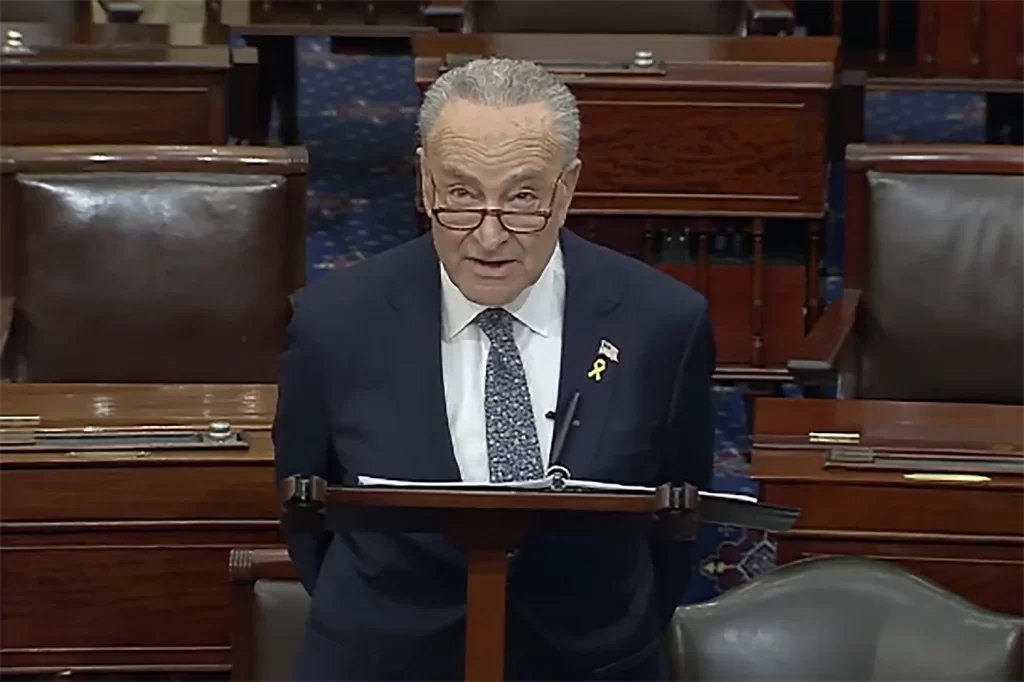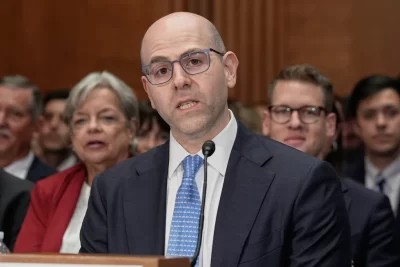
WASHINGTON— Republicans and Israeli officials were quick to express outrage after Senate Majority Leader Chuck Schumer sharply criticized Prime Minister Benjamin Netanyahu’s handling of the war in Gaza and called for Israel to hold new elections. They accused the Democratic leader of breaking the unwritten rule against interfering in a close ally’s electoral politics.
Senate Republican Leader Mitch McConnell reacted to Schumer by saying it was “hypocritical for Americans who hyperventilate about interference in our own democracy to call for the removal of a democratically elected leader.”
House Speaker Mike Johnson said Schumer’s call for new elections was “inappropriate.” Even Benny Gantz, a political rival of Netanyahu and member of Israel’s war cabinet, said Schumer’s remarks were “counterproductive.”
Schumer’s stinging rebuke of Netanyahu — the senator said the Israeli leader had “lost his way” and was an obstacle to peace — was certainly provocative but it was hardly norm-breaking. U.S. leaders, as well as American allies, are more frequently butting into electoral politics beyond the water’s edge.
Look no further than the close and historically complicated relationship that American presidents and congressional leaders have negotiated with Israel leaders over the last 75 years.
“It is an urban legend that we don’t intervene in Israeli politics and they don’t try to intervene in ours,” said Aaron David Miller, a senior fellow at the Carnegie Endowment for International Peace, who worked as a Middle East negotiator in Republican and Democratic administrations. “We do intercede and they do intercede in ours.”
In 2019, with just weeks to go before Netanyahu faced a difficult election, President Donald Trump abruptly declared the U.S. was recognizing Israel’s sovereignty over the disputed Golan Heights, giving Netanyahu a political boost just when he badly needed it.
In 2015, Republican House Speaker John Boehner invited Netanyahu to deliver an address to Congress during sensitive negotiations about Iran’s nuclear program and shortly before a national election in Israel.
Boehner did not coordinate the invitation with President Barack Obama’s administration. Obama declined to invite Netanyahu to the White House during the visit, with White House officials saying that holding such a visit so close to Israel’s election would be inappropriate.
The standard Obama set for a White House visit wasn’t one Bill Clinton subscribed to years earlier. In April 1996, Clinton invited Israeli Prime Minister Shimon Peres to the White House to sign a $100 million counter-terrorism accord shortly before an Israeli election. Years later, Clinton acknowledged in an interview that he was trying to give Peres a boost with voters.
It didn’t work; Peres lost to Netanyahu.
In practice, keeping out of allies’ elections has been more of a professed American value than enshrined protocol. U.S. leaders have frequently demonstrated a “varsity versus junior varsity” approach to how overtly they noodle in the internal politics of friends, says Edward Frantz, a University of Indianapolis historian. The bigger the ally’s economy, the less likely American leaders are to meddle openly in its elections.
“American politicians want to have it both ways,” Frantz said. “There are moments when American leaders want to and need to speak out and have their say. But there is reason to stay close to the lines on elections. You don’t want foreign governments to interfere in our own internal politics, either.”
The lines have only become blurrier in recent years, and are being tested by how world leaders are approaching November’s Biden-Trump rematch.
This past week, during a White House visit on the 25th anniversary of Poland’s accession into NATO, Polish Prime Minister Donald Tusk didn’t obscure his desire to see Biden win another term.
“I want you to know that your campaign four years ago was really inspirational for me and for so many Poles,” said Tusk, with conservative Polish President Andrzej Duda by his side. “And we were encouraged … after your victory. Thank you for your determination. It was something really important for — not only for the United States.”
Tusk later singled out Johnson, the Republican House speaker, to blame for Washington’s deadlock on a spending bill with $60 billion in aid for Ukraine, which is running low on ammunition and arms in its war with Russia.
“This is not some political skirmish that has significance only here, on the American political stage,” said Tusk. He told reporters that inaction by Johnson could “cost thousands of human lives in Ukraine.”
Last week, Biden slammed Trump for hosting Hungarian Prime Minister Viktor Orbán, who has described a possible comeback by Trump as the “only serious chance” for an end to the war in Ukraine.



